About the experts
|
Highlights
|
Love nuts? Nutrition experts encourage you to keep eating them, and the best ones aren't hard to find.
The reason is simple: Certain foods are known for their abundance of a specific nutrient. Consider oranges, famous for vitamin C; salmon, a great source of omega-3 fatty acids; or oysters, packed with zinc. However, nuts excel as an exceptionally concentrated source of diverse nutrients.
According to experts, nuts are nutritional powerhouses.Lona Sandon, holding a PhD and registered as both a dietitian nutritionist (RDN) and licensed dietitian (LD)., a UT faculty member who teaches Clinical NutritionSouthwestern. "They offer fiber, protein, good fats, and a variety of vitamins, minerals, and phytonutrients," encompassing quite a few that are familiar to us.don’t get enough of.
That's the reason nuts have risen in popularity as snacks, salad additions, smoothie components, and beyond; they represent more than just a fleeting health fad. Nuts are a key element in dietary plans most often suggested by physicians, such as theMediterranean and DASH diets.
Even though all nuts are generally seen as good for you, some kinds are linked to especially significant health advantages.
The health benefits of eating nuts
Katy Willbur, MS, RD, LDN, a Clinical Dietitian at the, states that eating any type of nut in reasonable amounts is good for your health.Tufts Medical Center's Frances Stern Nutrition Center.
A review of studies conducted in 2023 and published inFoodsSuggests that the way nutrients are distributed in nuts is linked to a lower risk of developing various long-term illnesses. In particular, a 2023 study featured inNutrientsEating nuts could lower your chances of developing heart problems by up to 25%. A separate study from 2022, featured inNutrition ReviewsConsuming a daily portion of nuts may lower your chances of experiencing depression and improve your general well-being.
“Nuts Willbur notes that nuts are a fantastic provider of unsaturated fats, known to help improve cholesterol. She continues, stating that fats are a vital component of our diets because they provide significant energy, help us absorb vitamins, and are crucial for cell development. She also points out that certain nuts are rich in essential fatty acids, which are fats the body can't produce on its own and must obtain through diet.
Nuts also boast a high fiber content, which is beneficial considering that most individuals only consume roughly 50% of the fiber they require each day, as per the...American Heart Association. Fiber is known to shield us from various long-term illnesses, and since it promotes satiety, it's also linked to losing weight.
Dr. Sandon points out that nuts are a valuable source of magnesium, a nutrient often lacking in people's diets. The body relies on magnesium for the proper function of every organ, according to the.National Library of Medicine—even slight shortages can cause health problems, such as tiredness, lack of strength, and shifts in emotions.
It's worth remembering that although nuts are packed with nutrients, they also contain a lot of calories. Therefore, controlling your portions is essential to maximize the advantages of eating the most nutritious nuts.
According to Dr. Sandon, the real issue with nuts lies in the unhealthy additions, such as salt and sugar. She advises, "Opt for raw or roasted varieties that are free from these extra ingredients." She also suggests, "Cracking nuts open yourself can help you eat more slowly, potentially preventing you from overeating."
The most nutritious nuts for your diet.
"In my opinion, nuts are a very healthful food," states Julia Zumpano, RD, LD.a registered dietitian working at the Cleveland Clinic Center for Human Nutrition. As an example, she highlights studies that appeared inNutrientsThis implies that a higher overall consumption of nuts is linked to a reduced likelihood of getting type 2 diabetes and heart problems.
To get the most nutrients, Zumpano suggests consuming different kinds of nuts.Here's a list of superstars hand-picked by our expert.
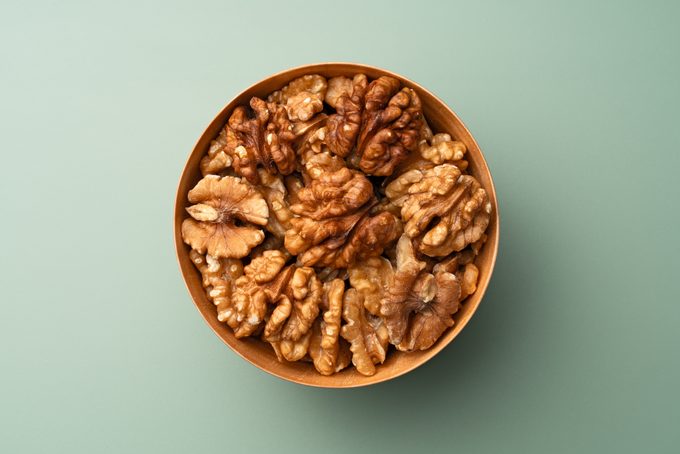
1. Walnuts
“According to Dr. Sandon, walnuts are a good source of omega-3 fatty acids. "These fats are vital for good health and are recognized for their ability to reduce inflammation," she explains.
Additionally, they boast significant levels of antioxidants, fiber, and protein while remaining low in.saturated fat, according to Zumpano. This nutrient composition has the potential to boost cholesterol levels that are beneficial for cardiovascular health.
A review conducted in 2024 examined research that had been published inFoods and HumanityBased on 23 years of research, walnuts are being called a "functional food." The review emphasizes a variety of related health advantages, such as:
- Heart health: Eating walnuts may help decrease levels of LDL cholesterol and lower your chances of developing heart problems.
- Brain boost: Walnuts contain plant-derived substances that could potentially boost brainpower.
- Immune system support: Research suggests walnuts could potentially improve the way your immune system works.
- Gut health: Walnuts include prebiotics, which have a beneficial effect on the bacteria in your digestive system.
Dr. Sandon mentions enjoying walnuts in oatmeal or other breakfast cereals. Zumpano also recommends incorporating walnuts into salads or Mediterranean-style rice dishes to provide a pleasant textural contrast.
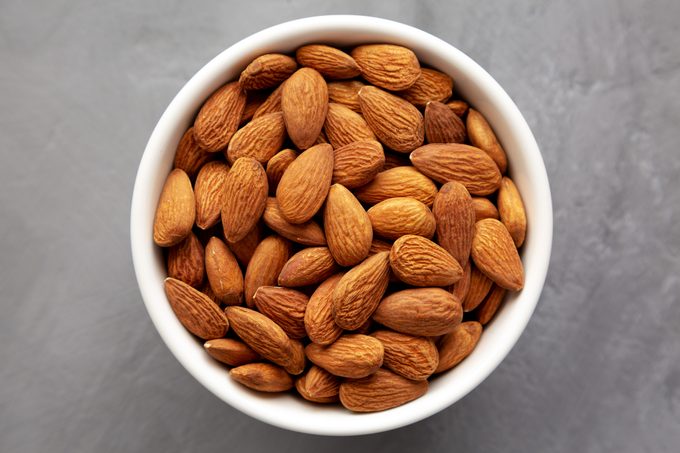
2. Almonds
Almonds boast a high content of monounsaturated fats, a kind of “healthy fatAccording to Zumpano, this food boosts beneficial HDL cholesterol while reducing harmful LDL cholesterol, making it a great asset for cardiovascular well-being. She also notes that its high fiber and protein content has a positive impact on blood sugar regulation.
Willbur points out that although all nuts provide magnesium, almonds are the best source. A serving of almonds has roughly 80 milligrams (mg) of magnesium, according toFoodData, representing roughly 20% of the recommended daily intake for men and 25% for women.
Dr. Sandon points out that almonds are rich in vitamin E, a nutrient that a staggering 88.5% of people in the United States are deficient in, based on the.Linus Pauling Instituteat Oregon State University. Eating a portion of almonds provides close to 50% of the daily value you should aim for.
This antioxidant provides a safeguard for your skin and eyes against harm, and it also strengthens your immune defenses. Although further investigation is warranted, theNIHVitamin E is also thought to potentially help prevent heart problems, vision issues, cancer, and reduced mental function.
Zumpano enjoys plain almonds as a snack. She also recommends almond butter with an apple or banana, or sprinkling slivered almonds on green beans or a salad. Dr. Sandon adds, "Sliced or slivered almonds are a fantastic addition to a stir-fry."
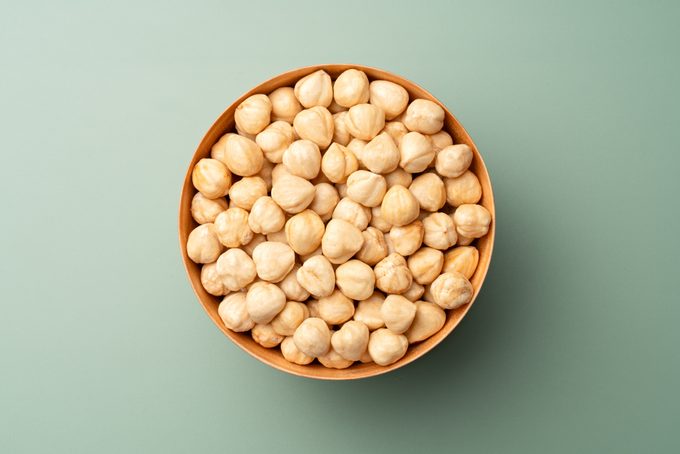
3. Hazelnuts
Hazelnuts boast a wealth of magnesium, B and E vitamins, and unsaturated fats, and are particularly high incalciumcompared to a lot of other nuts (although almonds contain a bit more). A portion of hazelnuts provides roughly 5% of your recommended daily value.
Furthermore, Zumpano notes that "studies indicate hazelnuts, when included in a nut blend, can potentially reduce blood sugar levels and enhance insulin sensitivity in individuals with type 2 diabetes." She adds, "They are a vital component of the Mediterranean diet."
A review of studies conducted in 2023 inNutrientsInvestigates further how hazelnuts can improve heart health, such as:
- Maintaining healthy cholesterol levels, which is important for a healthy heart.
- Rich in antioxidants, which combat oxidative stress, a contributor to numerous long-term illnesses.
- Minerals such as potassium and magnesium play a key role in regulating blood pressure.
Instead of grabbing a container ofNutellaZumpano recommends creating your own spread with hazelnuts, cocoa, and either maple syrup or honey, instead of using store-bought options that are loaded with vegetable oil, sugar, and additives.
"You have the ability to adjust the sweetness level to your liking, as just a little bit is all that's necessary." She's also a big fan of roasted hazelnuts—and theNutrientsStudies indicate that roasting may improve how easily your body can access and utilize certain antioxidants.
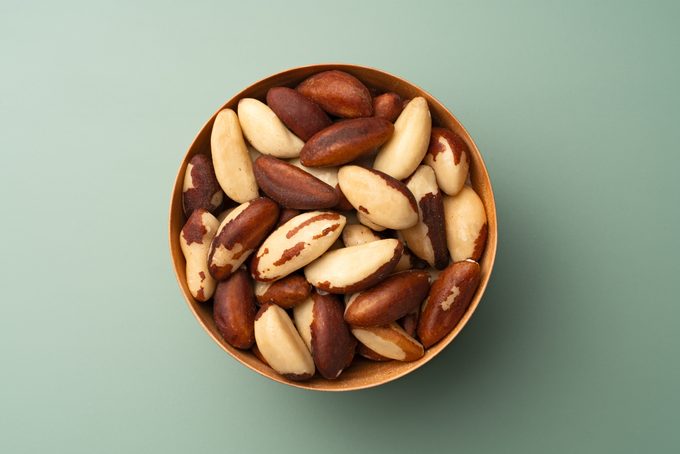
4. Brazil nuts
Brazil nuts are best known for one key attribute: “These are the richest dietary source ofselenium,” Zumpano states. “Consuming one or two Brazil nuts fulfills the daily selenium requirement.” Alternative sources such as seafood, beef, eggs, and whole grains contain roughly 25 to 50% less selenium per portion compared to a single Brazil nut.
Zumpano clarifies that selenium plays a vital role in thyroid operation, DNA creation, fertility, and shielding cells from harm. However, their nutritional value extends beyond just selenium. As stated in a 2025 review published inFood Chemistry, studies on people have suggested that eating one Brazil nut daily could:
- Boost the body's ability to fight oxidative stress.
- Reduce inflammatory processes
- Lower blood sugar levels
- Help control cholesterol
- Get rid of abdominal fat (visceral fat).
- Boost blood vessel function
However, Brazil nuts can offer tooToo much of a good thing can be harmful. Because selenium can be toxic if you consume too much, it's best to stick to a maximum of one to three Brazil nuts each day, according to experts. Enjoy them as a snack or chop them up and add them to your meals. For a smoother consistency in smoothies, try soaking them in water overnight.

5. Cashews
Like other nuts, cashewsThey pack a lot of nutrients into a small package, but also a lot of calories. However, studies suggest that cashews, specifically, may actually help with losing weight.
The Cleveland Clinicpoints to research indicating that we may not digest all the calories or fat from cashews, potentially making them a beneficial snack for those trying to lose weight.
Cashews, similar to other nuts packed with beneficial fats, fiber, and antioxidants, contribute to a healthy heart, stable blood sugar, and reduced inflammation. However, they are particularly notable for their iron content, according to Willbur. Research from 2024 indicates that a significant portion of the U.S. population – about one-third – needs to increase their iron intake.JAMA Network Open—Cashews offer approximately 2 mg of iron in each serving, which translates to roughly 11% of the Daily Value for women and 40% for men.
Cashews boast remarkable adaptability. Savor them uncooked, toasted, intact, or diced; furthermore, once softened in water, they effortlessly transform into smooth sauces and flavorful curries.cashew cheese.
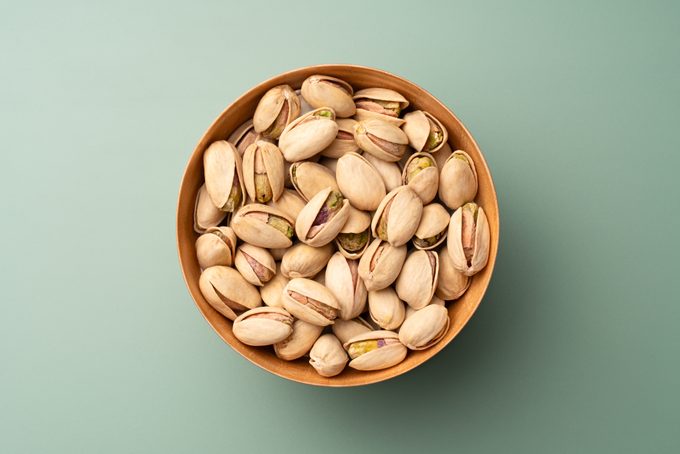
6. Pistachios
“In addition tAccording to Dr. Sandon, pistachios are rich in heart-healthy fats and also contain lutein, a nutrient beneficial for maintaining good eyesight. This was supported by research published in a 2025 study in.The Journal of NutritionResearch indicates that consuming pistachios fortifies a section of the eye responsible for safeguarding the retina, thereby lowering the likelihood of developing age-related macular degeneration (AMD), a primary contributor to vision impairment in seniors.
Additional studies, as seen in the 2022 issue ofNutrientsPistachios, according to reports, are packed with complete plant protein—including all nine essential amino acids—fiber that aids digestion, potent antioxidants derived from plants, and micronutrients such as potassium and vitamins C and E.
Pistachios are a nutritious and protein-packed way to add some texture to your dishes. They can also be easily ground and incorporated into baked treats, pesto made from scratch, breaded chicken, or even used as a spread. However, Dr. Sandon prefers to enjoy pistachios simply: “They’re great to munch on straight from the bag.”
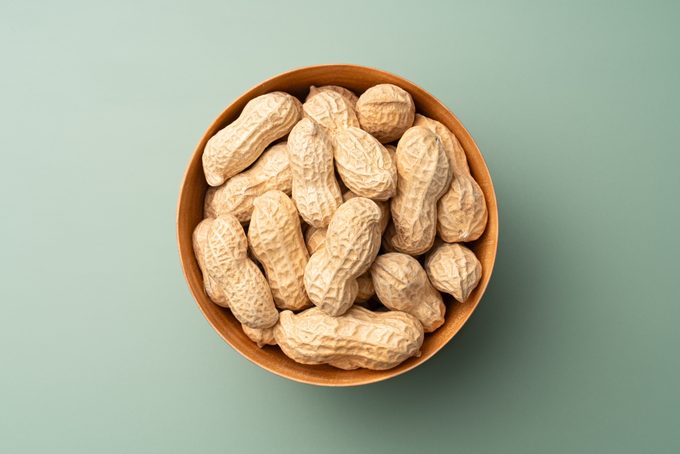
7. Peanuts
Although peanuts are botanically classified as legumes, their nutritional content is comparable to that of the most beneficial nuts, making them worthy of inclusion on this list, according to our panel of experts.
“PeanutsAccording to Dr. Sandon, they boast polyunsaturated fats and are rich in vitamin E and B vitamins. Willbur adds that the monounsaturated fats found in peanuts, specifically, can contribute to reducing LDL cholesterol, which is considered the unhealthy kind.
Peanuts boast significant levels of antioxidants and fiber. They also rival almonds in protein content, offering approximately 7 grams per ounce, which is the highest among nuts. Dr. Sandon suggests that this amount, about a handful, makes for a satisfying snack. She also proposes adding peanuts to salads or stir-fries.
Nonetheless, peanuts might pack an even greater punch than we realize. A study slated for release in 2025, appearing inAntioxidantsEating peanuts could potentially help to delay aging on a cellular level, according to some suggestions. Although further investigation is necessary, there might be a connection between eating peanuts and keeping cells healthy and promoting a long life.
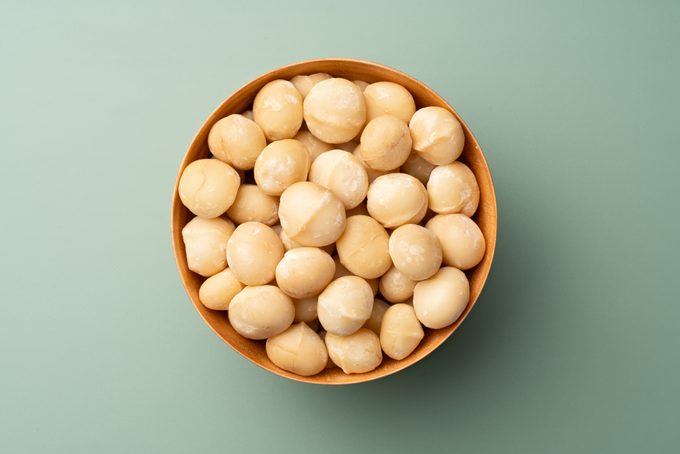
8. Macadamia nuts
According to Dr. Sandon, macadamia nuts typically contain more saturated fat than other nuts. On the other hand, they boast the highest concentration of beneficial monounsaturated fats, nearly twice as much as almonds, which come in second place.
This significant amount of good fat is linked to a decrease in heart disease risk factors. The connection is so clear that the FDA has authorized a qualified health claim for a 1.5-ounce portion of macadamia nuts and a lowered chance of developing coronary heart disease, based on 2023 studies.Advances in Nutrition.
Another study from 2023 that appeared in theJournal of Nutritional ScienceThe study demonstrates that consuming macadamia nuts for only eight weeks led to a reduction in cholesterol levels, with the effect being more pronounced in individuals with lower BMIs and body fat percentages. Despite consuming more calories, participants did not gain weight or accumulate additional body fat.
This outcome leads the researchers to believe they might have discovered an additional advantage of macadamia nuts: curbing hunger. Their idea is that the abundance of beneficial fats in macadamias influences our satiety hormones, which are the hormones that signal when we're satisfied.
Macadamia nuts are frequently used in pastries and desserts, but they can also be chopped and used as a crispy coating for your preferred protein. Give these a shot.macadamia-crusted mahi mahi and salmonrecipes from our affiliated websiteTaste of Home.
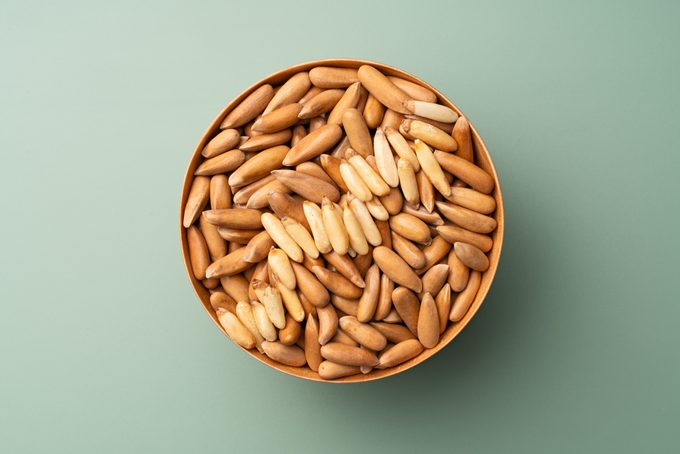
9. Pine nuts
Pine nuts boast the most zinc among nuts, offering roughly 22% of the Daily Value for women and 16% for men per serving. (In terms of iron content, they rank second only to cashews.) A study from 2025 revealed that...Scientific Reportssuggests that a significant portion of American adults, especially women, are not getting enough zinc in their diets.
According to the study, zinc is vital for a healthy brain and offers anti-inflammatory and antioxidant benefits throughout the body, notably for the heart. The findings also indicated that insufficient zinc is linked to an increased chance of suffering a stroke.
Other studies indicate that consuming pine nuts could help reduce hunger. The piece, which appeared in 2023 in theInternational Scientific Publication of Molecular Studies, highlighting research that indicates pine nuts can boost levels of satiety hormones like glucagon-like peptides (GLP-1), leading to an average reduction in food consumption of 36%. Medications often target GLP-1, the same hormone.Ozempic. Nevertheless, further investigation is required to fully understand this possible outcome.
Pine nuts are well-known as a key component of pesto, but here are 14 additional uses.pine nut recipes from Taste of Home.
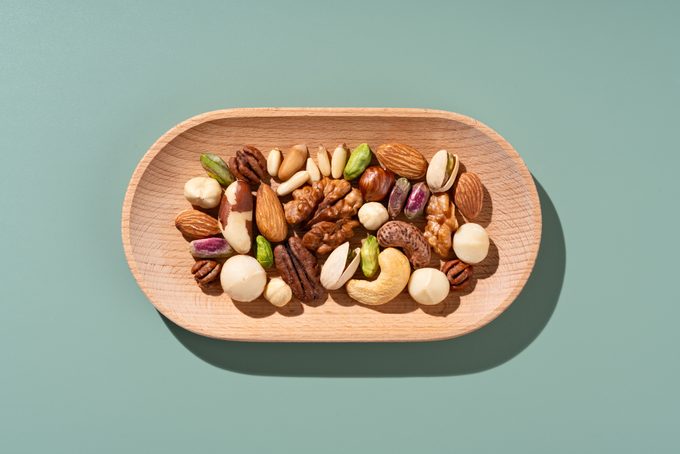
What is the recommended serving size for nuts?
A portion sizeZumpano clarifies that when it comes to nuts, it's not the quantity you consume that matters, but rather the weight or size of the portion. She generally advises that a serving of nuts should have around 200 calories and 15 to 20 grams of fat.
- An ounce, or 28 grams when measured by weight.
- 1/4 cup by volume
- If you're having nut butter, go for two tablespoons.
Willbur notes that while you could meticulously portion out a quarter cup of nuts and package them for snacking, grabbing a handful generally yields roughly the same amount.
Additional elements can also affect what constitutes an appropriate serving size, including your overall calorie and fat intake. “IIf nuts are your primary fat source, you can increase your intake slightly," suggests Zumpano. "However, if your diet is...rich in fatIf you're getting fats from other places—like oils, meats, cheese, seeds, avocados, or processed foods—you should cut back or swap those fats for nuts instead.

Potential allergies and considerations
According to research, tree nut allergies affect roughly 0.5% to 1% of individuals in the United States.American Academy of Allergy, Asthma, and Immunology(AAAAI). However, this kind of allergy varies from person to person; only medical tests can pinpoint the exact nuts a person is allergic to.
The American Academy of Allergy, Asthma & Immunology states that the majority of individuals who have atree nut allergyIt's generally safe to eat seeds, such as macadamia nuts and pine nuts, which are technically classified as seeds. Individuals with peanut allergies are often able to consume tree nuts; however, cross-reactivity can occur. Therefore, it's recommended that anyone with a nut allergy consult with an allergist to establish safe dietary guidelines.
Even without an allergy, consuming excessive amounts of Brazil nuts can lead to problems. They contain a very high concentration of selenium, an essential nutrient that can become poisonous in large doses.
The Merck Diagnostic and Treatment HandbookAccording to reports, exceeding 900 mcg of selenium can result in toxic effects, and theFDAThe safe upper limit is established at 400 mcg, while the Recommended Daily Allowance (RDA) for adults is 55 mcg. Selenium poisoning typically leads to digestive problems, but can also manifest as hair loss, nail problems, skin inflammation, nerve damage, tiredness, crankiness, and breath that smells like garlic.

Shopping tips for nuts.
Aside from allergies and possible poisonous effects, the primary "risks" associated with nut consumption stem from additives that compromise their excellent nutritional profile. Willbur advised, "Opt for nuts with minimal added ingredients whenever possible." Pay particular attention to the presence of extra salt, sugars, and oils.
This principle also applies to...nut butters. Zumpano points out that natural nut butters, those without extra ingredients or sugars, provide the same nutritional value as whole nuts. She emphasizes that the only thing in your nut butter should be nuts, with a tiny bit of salt being acceptable. But, similar to limiting yourself to a handful of nuts, remember to watch how much nut butter you eat. Experts recommend a serving size of two tablespoons.
“When purchasing pre-seasoned nuts, pay close attention to the sodium levels. Consuming three to four portions in one sitting can quickly lead to a sodium intake of 800mg or higher," Willbur cautions. "Trail mix can be surprisingly tempting, and although it includes nuts that are good for your heart, it often has extra sugars, salts, and oils. Be conscious of how much you're eating.trail mixbecause it packs a lot of calories into a small serving."
For this reason, she recommends preparing your own flavored nuts in your kitchen.
1. Willbur points out that the nutritional content of roasted and raw nuts is almost identical, so choose whichever you like best. 2. For creating your own seasoned nuts at home, she recommends: "Try roasting almonds with cinnamon and vanilla extract, or create a zesty nut mix by combining chili powder, garlic powder, and paprika with your preferred nuts and baking them."
Stay informed about your well-being by subscribing to daily updates.The Healthy, brought to you by Reader's Digest.newsletter and follow The Healthy on Facebook and Instagram. Keep reading:
- Tiger Nuts: What They Are and Whether You Should Include Them in Your Diet.
- A 30-year study discovered that consuming this food even once weekly may lead to better heart health.
- A Nutritionist Claims These 10 Proteins Are "Perfect"
- I Consumed Peanut Butter Daily for a Week—Here's the Outcome
Post a Comment for "Top 9 Nuts for Optimal Health"